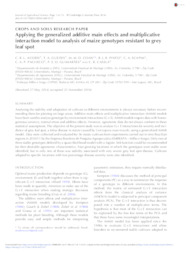Applying the generalized additive main effects and multiplicative interaction model to analysis of maize genotypes resistant to grey leaf spot.
Applying the generalized additive main effects and multiplicative interaction model to analysis of maize genotypes resistant to grey leaf spot.
Author(s): ACORSI, C. R. L.; GUEDES, T. A.; COAN, M. M. D.; PINTO, R. J. B.; SCAPIM, C. A.; PACHECO, C. A. P.; GUIMARAES, P. E. de O.; CASELA, C. R.
Summary: Analysing the stability and adaptation of cultivars to different environments is always necessary before recommending them for planting on large areas. Additive main effects and multiplicative interaction (AMMI) models have been used to analyse genotype-by-environment interactions (G × E). AMMI models require data with homogeneous variance, normal errors and additive effects. However, agronomic data do not always conform to these statistical assumptions. The objective of the present study was to analyse G × E interactions for severity and incidence of grey leaf spot, a foliar disease in maize caused by Cercospora zeae-maydis, using a generalized AMMI model. Data were collected and evaluated for 36 maize cultivars from experiments carried out in nine Brazilian regions in 2010/11 by the Empresa Brasileira de Pesquisa Agropecuária (EMBRAPA?Milho e Sorgo). Only two of three stable genotypes defined by a quasi-likelihood model with a logistic link function could be recommended for their desirable agronomic characteristics. Four growing locations in which the genotypes were stable were identified, but in only one of these was stability associated with very severe grey leaf spot disease. Cultivars adapted to specific locations with low percentage disease severity were also identified.
Publication year: 2016
Types of publication: Journal article
Keywords: Maize, Mancha foliar, Milho
Observation
Some of Embrapa's publications are published as ePub files. To read them, use or download one of the following free software options to your computer or mobile device. Android: Google Play Books; IOS: iBooks; Windows and Linux: Calibre.
Access other publications
Access the Agricultural Research Database (BDPA) to consult Embrapa's full library collection and records.
Visit Embrapa Bookstore to purchase books and other publications sold by Embrapa.

